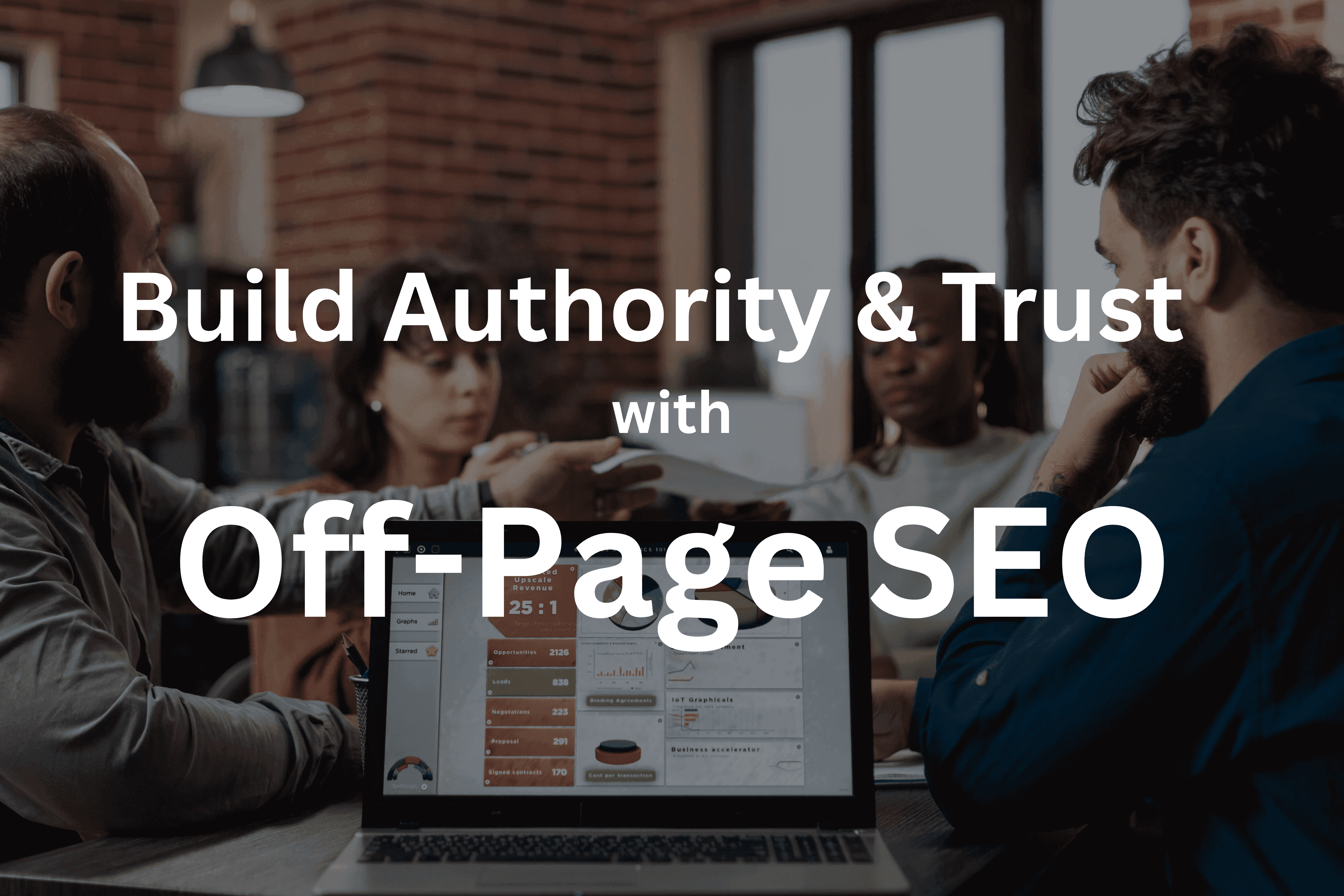Off-page SEO is an important component of any comprehensive search engine optimization strategy. While on-page SEO focuses on optimizing elements within your website, off-page SEO involves activities conducted outside the boundaries of your website to improve its search engine rankings.
These external factors play a considerable role in establishing your website’s authority, trustworthiness, and overall reputation in the eyes of search engines like Google. By focusing on off-page SEO, you can improve your site’s visibility, drive more organic traffic, and eventually achieve higher search engine rankings.
Off-page SEO have a variety of techniques, including link building, social media signals, guest blogging, and brand mentions, all of which contribute to creating authority and trust for your website. In this blog, we will explore several key aspects of off-page SEO, detailing how each component can be leveraged to build authority and trust:
- Link Building: Importance of acquiring high-quality backlinks, various strategies, and the tools that can help in this process.
- Social Media Signals: How social media activity influences SEO and best practices for social media marketing, and see real-life case studies.
- Guest Blogging: Benefits of guest blogging, how to find and approach opportunities, and best practices for creating effective guest posts.
- Brand Mentions: Importance of tracking and purchasing brand mentions, the value of unlinked brand mentions, and the tools available for monitoring them.
By the end of this blog, you’ll have a complete understanding of off-page SEO strategies and how they can help you build authority and trust for your website. Stay tuned as we explore each of these topics in detail, showing actionable tips and best practices to upgrade your off-page SEO game.
Link Building

Backlinks, also known as inbound or incoming links, are necessary for off-page SEO. They act as favours from other websites, signalling to search engines that your content is valuable and trustworthy. High-quality backlinks can seriously increase your website’s authority and improve its search engine rankings.
When authoritative sites connect to your content, it points to search engines like Google that your website is a reliable source of information, which can improve your site’s visibility and attract more organic traffic.
Strategies for Acquiring High-Quality Links
Guest Blogging:
Guest blogging involves writing articles for other reputed websites in your industry. By contributing valuable content, you can acquire backlinks to your site. Ensure that your target websites have high domain authority and engaged audiences. Approach guest blogging with a focus on providing genuine value in the industry, rather than just acquiring links.
Outreach:
Reach out to bloggers, influencers, and industry experts to get backlinks. Make your emails personal and explain why linking to your content benefits them. Build relationships by offering to share their content in return, which can urge them to link back to your site.
Creating Link-Worthy Content:
Produce high-quality, informative, and engaging content that others naturally want to link to. This can include in-depth guides, case studies, infographics, and original research. The more valuable and unique your content will be, the more likely it is to attract backlinks.
Resource Pages:
Many websites have resource or link pages where they create valuable content related to their industry. Identify these pages and reach out to the site owners, suggesting your content as a useful addition to their list of resources.
Broken Link Building:
Find broken links on other websites and suggest your content as a replacement. This not only helps the website owner fix an issue but also provides you with a valuable backlink.
Tools for Link Building
Ahrefs:
Ahrefs is a powerful SEO tool that provides insights into your backlink profile and that of your competitors. Use it to identify link-building opportunities, analyze competitor backlinks, and track the success of your link-building campaigns.
SEMrush:
SEMrush offers a complete backlink analysis tool that helps you find prospects for link building. It also allows you to monitor your backlinks, assess their quality, and discover new link opportunities.
Moz Link Explorer:
Moz Link Explorer helps you review your and your competitor’s backlinks. It provides detailed information on link quality and helps you find new link-building options.
Hunter.io:
Hunter.io is an outreach tool that helps you find email addresses associated with the websites you want to target for link building. This simplifies the process of reaching out to potential link partners.
BuzzSumo:
BuzzSumo allows you to identify popular content in your niche and see who is linking to it. This can help you understand what type of content attracts backlinks and who you should reach out to for link-building opportunities. Effective link-building is crucial for off-page SEO. With a strategic approach, you can greatly enhance your site’s visibility and credibility.
Social Media Signals

Social media signals refer to the collective engagement metrics (likes, shares, comments, etc.) that content receives on social media platforms. While social media signals are not direct ranking factors for search engines, they significantly impact off-page SEO by improving content visibility and pushing traffic. When your content is widely shared and engaged with on social media, it increases the chances of earning high-quality backlinks, which are essential for building authority. Additionally, a strong social media presence can raise brand awareness and credibility, contributing to overall trust and authority in your niche.
Best Practices for Social Media Marketing
Share High-Quality Content:
Consistently post valuable, relevant, and engaging content that appeals to your audience. This increases the chance of shares, comments, and other forms of engagement, which can indirectly expand your off-page SEO efforts.
Optimize Social Media Profiles:
Ensure your social media profiles are complete and optimized with relevant keywords. Use a consistent brand voice and graphics across all platforms to build a recognizable and trustworthy brand presence.
Engage with Your Audience:
Actively interact with your followers by responding to comments, participating in discussions, and recognising shares and mentions. Building a strong relationship with your audience can lead to increased engagement and more organic sharing of your content.
Utilize Influencers:
Collaborate with influencers in your industry to expand your reach. Influencers can help promote your content to a broader audience, increasing its visibility and the possibility of earning backlinks.
Utilize Hashtags Strategically:
Use relevant and trending hashtags to increase the visibility of your content on social media platforms. This can help you reach a wider audience and increase engagement.
Monitor and Analyze Performance:
Use analytics tools provided by social media platforms to track the performance of your content. Understanding what works and what doesn’t allows you to reconsider your strategy for better results.
Case Studies
Case Study: Neil Patel’s Content Marketing:
Neil Patel, a well-known digital marketer, broadly uses social media to promote his content. By sharing high-quality blog posts, infographics, and videos on platforms like Facebook, Twitter, and LinkedIn, he drives significant traffic to his website. This increased visibility helps him earn high-quality backlinks, improving his off-page SEO and building authority in the digital marketing space.
Example: Buffer’s Social Media Strategy:
Buffer, a social media management tool, effectively uses social media to engage with its audience and share valuable content. Their consistent posting of blog articles, tips, and case studies on social media platforms has helped them build a strong online presence. This engagement not only drives traffic to their website but also encourages backlinks from other authoritative sites. You can effectively use social media signals to enhance your off-page SEO efforts. This, in turn, helps in building authority and trust, driving more organic traffic, and improving your search engine rankings.
Guest Blogging

Benefits of Guest Blogging
Guest blogging is a powerful off-page SEO strategy that involves writing and publishing articles on other websites within your industry. This practice offers several key benefits:
Building Authority:
Guest blogging on reputable sites increases your credibility and establishes you as an authority in your niche. When your content appears on high-value platforms, it signals to both search engines and users that you are a trusted expert.
Link Building:
One of the primary benefits of guest blogging is the opportunity to include backlinks to your website. High-quality backlinks from authoritative sites improve your site’s domain authority and raise your search engine rankings.
Expanding Reach:
Guest blogging allows you to utilize the established audience of the host site, driving more traffic to your website. This exposure can lead to increased brand awareness and potential new customers.
Networking Opportunities:
Engaging with other industry leaders through guest blogging can open doors for future collaborations, partnerships, and further link-building opportunities.
How to Find and Approach Guest Blogging Opportunities
Identify Relevant Sites:
Look for blogs and websites within your industry that accept guest posts. Focus on those with high domain authority and committed audience. Tools like Ahrefs and SEMrush can help you identify potential sites based on their SEO metrics and audience engagement.
Research the Site’s Content:
Before reaching out, educate yourself with the content style, topics, and audience of the target site. Ensure that your submitted topics align with their content and add value to their readers.
Craft a Compelling Pitch:
When contacting site owners or editors, personalize your email and highlight your expertise. Clearly explain the benefits of your guest post for their audience and provide a few topic ideas that fit their content strategy. Be concise, and professional, and show your understanding of their site’s niche.
Showcase Your Work:
Include links to your previous work or your blog to showcase your writing style and expertise. This will help build trust and credibility, increasing the chances of your email being accepted.
Best Practices for Writing Guest Posts
Deliver High-Quality Content:
Write informative, engaging, and well-researched articles that provide real value to the target site’s audience. High-quality content is more likely to be accepted and shared, which helps with link-building and building authority.
Follow Guidelines:
Stick to the guest posting guidelines provided by the host site. This includes formatting, word count, tone, and any specific SEO requirements such as keyword usage.
Include Relevant Links:
Strategically place backlinks to your site within the guest post. Ensure the links are relevant and add value to the content. Avoid overloading the article with too many links, as this can be spammy.
Promote Your Guest Post:
Once your guest post is published, share it on your social media channels, email newsletters, and other platforms. This not only drives traffic to the host site but also indicates your commitment to promoting the partnership.
Engage with the Audience:
Respond to comments and engage with readers on the host site. This interaction can further establish your authority and build relationships with a new audience. Guest blogging is an integral part of your off-page SEO strategy, you can effectively build authority, enhance your link-building efforts, and expand your reach within your industry.
Brand Mentions

Tracking and Using Brand Mentions
Brand mentions referring to representatives where your brand is mentioned online, whether in articles, blog posts, social media, forums, or reviews. Tracking and leveraging these mentions is essential for off-page SEO as they help build authority and trust.
Monitor Online Mentions:
Regularly track where and how your brand is being mentioned across the web. This helps you stay informed about your brand’s online presence and reputation.
Respond to Mentions:
Engage with those who mention your brand. Responding to positive mentions can encourage goodwill while addressing negative mentions can reduce potential damage and show your commitment to customer satisfaction.
Utilize Positive Mentions:
Share positive brand mentions on your social media channels, website, or marketing materials. This social proof can improve your brand’s credibility and authority.
Importance of Unlinked Brand Mentions
Unlinked brand mentions occur when your brand is mentioned without a corresponding hyperlink to your website. While not as powerful as linked mentions, unlinked mentions still contribute to off-page SEO by increasing brand visibility and recognition.
Building Authority:
Search engines recognize unlinked brand mentions as indicators of brand presence and influence. Frequent mentions across reputable sites can signal to search engines that your brand is well-regarded, enhancing your authority.
Link Building Opportunities:
Unlinked mentions present opportunities for acquiring backlinks. Reach out to the site owners or authors and politely request that they add a link to your website. This not only turns unlinked mentions into valuable backlinks but also supports your link-building efforts.
Brand Awareness:
Unlinked mentions help increase brand awareness and visibility among potential customers. Even without a direct link, being mentioned frequently can drive traffic to your site as people search for your brand independently.
Tools for Tracking Brand Mentions
Google Alerts:
A free tool that sends notifications whenever your brand is mentioned online. Set up alerts for your brand name, key products, or relevant keywords to stay updated on brand mentions.
Ahrefs:
Besides being a powerful link-building tool, Ahrefs also allows you to track brand mentions. It provides detailed insights into where and how your brand is mentioned, helping you identify opportunities for acquiring backlinks.
SEMrush:
SEMrush’s Brand Monitoring tool helps track online mentions of your brand, products, and competitors. It offers complete reports on the sources and ideas of mentions, assisting in your off-page SEO efforts.
Mention:
A dedicated tool for monitoring brand mentions across various online platforms, including social media, blogs, and news sites. Mention provides real-time alerts and analytics to help you manage and leverage your brand’s online presence.
BuzzSumo:
This tool not only tracks brand mentions but also identifies the most influential sources mentioning your brand. BuzzSumo’s analytics can help you understand the impact of these mentions and strategize accordingly. These tools will ensure you stay on top of your brand’s presence across the web, allowing you to capitalize on every mention to boost your SEO and brand visibility.
Boost Your Off-Page SEO with Our Expertise!

In this blog, we’ve explored the critical aspects of off-page SEO and how they contribute to building authority and trust for your website. Here’s a quick recap of the key points:
Link Building:
We explored the importance of backlinks and provided strategies for acquiring high-quality links through guest blogging, outreach, and creating link-worthy content. Tools like Ahrefs, SEMrush, and Moz Link Explorer can significantly help your link-building efforts.
Social Media Signals:
Social media engagement can indirectly impact your SEO by increasing content visibility and driving traffic. By following best practices for social media marketing and learning from successful case studies, you can enhance your off-page SEO.
Guest Blogging:
Writing guest posts for authoritative sites helps in link-building and building authority. We discussed how to find and approach guest blogging opportunities and best practices for writing guest posts that add value.
Brand Mentions:
Tracking and utilizing brand mentions, including unlinked mentions, can enhance your online presence. Using tools like Google Alerts, Ahrefs, SEMrush, Mention, and BuzzSumo helps you stay on top of your brand’s mentions and turn them into valuable SEO assets.
Implement Off-Page SEO Strategies
Implementing these off-page SEO strategies is essential for improving your website’s authority and trustworthiness. By focusing on link building, utilizing social media signals, engaging in guest blogging, and tracking brand mentions, you can significantly boost your site’s search engine rankings and attract more organic traffic. Consistency and dedication to these practices will yield long-term benefits for your SEO efforts.
Ready to take your off-page SEO to the next level? Partner with us for expert off-page SEO services that will help you build authority and trust. Our team of SEO specialists is dedicated to implementing proven strategies as per your specific needs. We understand the complexities of off-page SEO, including link building, guest blogging, and monitoring brand mentions, to ensure your website achieves the highest rankings possible. Contact us today to learn how our off-page SEO expertise can push your business forward. Let’s work together to build an online presence that stands out in your industry and attracts the traffic you deserve.

